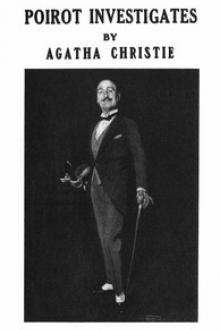Poirot Investigates - Agatha Christie (popular novels .txt) 📗

- Author: Agatha Christie
- Performer: -
Book online «Poirot Investigates - Agatha Christie (popular novels .txt) 📗». Author Agatha Christie
She stopped.
“Épatant!” murmured Poirot. “Without doubt a romance of the first water.” He turned to Mary Marvell. “And you are not afraid, madame? You have no superstitious terrors? You do not fear to introduce these two Siamese twins to each other lest a Chinaman should appear and, hey presto! whisk them both back to China?”
His tone was mocking, but I fancied that an undercurrent of seriousness lay beneath it.
“I don’t believe that Lady Yardly’s diamond is anything like as good a stone as mine,” said Miss Marvell. “Anyway, I’m going to see.”
What more Poirot would have said I do not know, for at that moment the door flew open, and a splendid-looking man strode into the room. From his crisply curling black head, to the tips of his patent-leather boots, he was a hero fit for romance.
“I said I’d call round for you, Mary,” said Gregory Rolf, “and here I am. Well, what does Monsieur Poirot say to our little problem? Just one big hoax, same as I do?”
Poirot smiled up at the big actor. They made a ridiculous contrast.
“Hoax or no hoax, Mr. Rolf,” he said dryly, “I have advised Madame your wife not to take the jewel with her to Yardly Chase on Friday.”
“I’m with you there, sir. I’ve already said so to Mary. But there! She’s a woman through and through, and I guess she can’t bear to think of another woman outshining her in the jewel line.”
“What nonsense, Gregory!” said Mary Marvell sharply. But she flushed angrily.
Poirot shrugged his shoulders.
“Madame, I have advised. I can do no more. C’est fini.”
He bowed them both to the door.
“Ah! la la,” he observed, returning. “Histoire de femmes! The good husband, he hit the nail on the head—tout de même, he was not tactful! Assuredly not.”
I imparted to him my vague remembrances, and he nodded vigorously.
“So I thought. All the same, there is something curious underneath all this. With your permission, mon ami, I will take the air. Await my return, I beg of you. I shall not be long.”
I was half asleep in my chair when the landlady tapped on the door, and put her head in.
“It’s another lady to see Mr. Poirot, sir. I’ve told her he was out, but she says as how she’ll wait, seeing as she’s come up from the country.”
“Oh, show her in here, Mrs. Murchison. Perhaps I can do something for her.”
In another moment the lady had been ushered in. My heart gave a leap as I recognized her. Lady Yardly’s portrait had figured too often in the Society papers to allow her to remain unknown.
“Do sit down, Lady Yardly,” I said, drawing forward a chair. “My friend Poirot is out, but I know for a fact that he’ll be back very shortly.”
She thanked me and sat down. A very different type, this, from Miss Mary Marvell. Tall, dark, with flashing eyes, and a pale proud face—yet something wistful in the curves of the mouth.
I felt a desire to rise to the occasion. Why not? In Poirot’s presence I have frequently felt a difficulty—I do not appear at my best. And yet there is no doubt that I, too, possess the deductive sense in a marked degree. I leant forward on a sudden impulse.
“Lady Yardly,” I said, “I know why you have come here. You have received blackmailing letters about the diamond.”
There was no doubt as to my bolt having shot home. She stared at me open-mouthed, all colour banished from her cheeks.
“You know?” she gasped. “How?”
I smiled.
“By a perfectly logical process. If Miss Marvell has had warning letters——”
“Miss Marvell? She has been here?”
“She has just left. As I was saying, if she, as the holder of one of the twin diamonds, has received a mysterious series of warnings, you, as the holder of the other stone, must necessarily have done the same. You see how simple it is? I am right, then, you have received these strange communications also?”
For a moment she hesitated, as though in doubt whether to trust me or not, then she bowed her head in assent with a little smile.
“That is so,” she acknowledged.
“Were yours, too, left by hand—by a Chinaman?”
“No, they came by post; but, tell me, has Miss Marvell undergone the same experience, then?”
I recounted to her the events of the morning. She listened attentively.
“It all fits in. My letters are the duplicates of hers. It is true that they came by post, but there is a curious perfume impregnating them—something in the nature of joss-stick—that at once suggested the East to me. What does it all mean?”
I shook my head.
“That is what we must find out. You have the letters with you? We might learn something from the postmarks.”
“Unfortunately I destroyed them. You understand, at the time I regarded it as some foolish joke. Can it be true that some Chinese gang are really trying to recover the diamonds? It seems too incredible.”
We went over the facts again and again, but could get no further towards the elucidation of the mystery. At last Lady Yardly rose.
“I really don’t think I need wait for Monsieur Poirot. You can tell him all this, can’t you? Thank you so much, Mr.——”
She hesitated, her hand outstretched.
“Captain Hastings.”
“Of course! How stupid of me. You’re a friend of the Cavendishes, aren’t you? It was Mary Cavendish who sent me to Monsieur Poirot.”
When my friend returned, I enjoyed telling him the tale of what had occurred during his absence. He cross-questioned me rather sharply over the details of our conversation and I could read between the lines that he was not best pleased to have been absent. I also fancied that the dear old fellow was just the least inclined to be jealous. It had become rather a pose with him to consistently belittle my abilities, and I think he was chagrined at finding no loophole for criticism. I was secretly rather pleased with myself, though I tried to conceal the fact for fear of irritating him. In spite of his idiosyncrasies, I was deeply attached to my quaint little friend.
“Bien!” he said at length, with a curious look on his face. “The plot develops. Pass me, I pray you, that ‘Peerage’ on the top shelf there.” He turned the leaves. “Ah, here we are! ‘Yardly . . . 10th viscount, served South African War’ . . . tout ça n’a pas d’importance . . . ‘mar. 1907 Hon. Maude Stopperton, fourth daughter of 3rd Baron Cotteril’ . . . um, um, um, . . . ‘has iss. two daughters, born 1908, 1910. . . . Clubs . . . residences.’ . . . Voilà, that does not tell us much. But to-morrow morning we see this milord!”
“What?”
“Yes. I telegraphed to him.”
“I thought you had washed your hands of the case?”
“I am not acting for Miss Marvell since she refuses to be guided by my advice. What I do now is for my own satisfaction—the satisfaction of Hercule Poirot! Decidedly, I must have a finger in this pie.”
“And you calmly wire Lord Yardly to dash up to town just to suit your convenience. He won’t be pleased.”
“Au contraire, if I preserve for him his family diamond, he ought to be very grateful.”
“Then you really think there is a chance of it being stolen?” I asked eagerly.
“Almost a certainty,” replied Poirot placidly. “Everything points that way.”
“But how——”
Poirot stopped my eager questions with an airy gesture of the hand.
“Not now, I pray you. Let us not confuse the mind. And observe that ‘Peerage’—how you have replaced him! See you not that the tallest books go in the top shelf, the next tallest in the row beneath, and so on. Thus we have order, method, which, as I have often told you, Hastings——”
“Exactly,” I said hastily, and put the offending volume in its proper place.
Lord Yardly turned out to be a cheery, loud-voiced sportsman with a rather red face, but with a good-humoured bonhomie about him that was distinctly attractive and made up for any lack of mentality.
“Extraordinary business this, Monsieur Poirot. Can’t make head or tail of it. Seems my wife’s been getting odd kind of letters, and that this Miss Marvell’s had ’em too. What does it all mean?”
Poirot handed him the copy of Society Gossip.
“First, milord, I would ask you if these facts are substantially correct?”
The peer took it. His face darkened with anger as he read.
“Damned nonsense!” he spluttered. “There’s never been any romantic story attaching to the diamond. It came from India originally, I believe. I never heard of all this Chinese god stuff.”
“Still, the stone is known as ‘The Star of the East.’”
“Well, what if it is?” he demanded wrathfully.
Poirot smiled a little, but made no direct reply. “What I would ask you to do, milord, is to place yourself in my hands. If you do so unreservedly, I have great hopes of averting the catastrophe.”
“Then you think there’s actually something in these wild-cat tales?”
“Will you do as I ask you?”
“Of course I will, but——”
“Bien! Then permit that I ask you a few questions. This affair of Yardly Chase, is it, as you say, all fixed up between you and Mr. Rolf?”
“Oh, he told you about it, did he? No, there’s nothing settled.” He hesitated, the brick-red colour of his face deepening. “Might as well get the thing straight. I’ve made rather an ass of myself in many ways, Monsieur Poirot—and I’m head over ears in debt—but I want to pull up. I’m fond of the kids, and I want to straighten things up, and be able to live on at the old place. Gregory Rolf is offering me big money—enough to set me on my feet again. I don’t want to do it—I hate the thought of all that crowd play-acting round the Chase—but I may have to, unless——” He broke off.
Poirot eyed him keenly. “You have, then, another string to your bow? Permit that I make a guess? It is to sell the Star of the East?”
Lord Yardly nodded. “That’s it. It’s been in the family for some generations, but it’s not entailed. Still, it’s not the easiest thing in the world to find a purchaser. Hoffberg, the Hatton Garden man, is on the look-out for a likely customer, but he’ll have to find one soon, or it’s a washout.”
“One more question, permettez—Lady Yardly, which plan does she approve?”
“Oh, she’s bitterly opposed to my selling the jewel. You know what women are. She’s all for this film stunt.”
“I comprehend,” said Poirot. He remained a moment or so in thought, then rose briskly to his feet. “You return to Yardly Chase at once? Bien! Say no word to anyone—to anyone mind—but expect us there this evening. We will arrive shortly after five.”
“All right, but I don’t see——”
“Ça n’a pas d’importance,” said Poirot kindly. “You will that I preserve for you your diamond, n’est-ce pas?”
“Yes, but——”
“Then do as I say.”
A sadly bewildered nobleman left the room.
It was half-past five when we arrived at Yardly Chase, and followed the dignified butler to the old panelled hall with its fire of blazing logs. A pretty picture met our eyes: Lady Yardly and her





Comments (0)